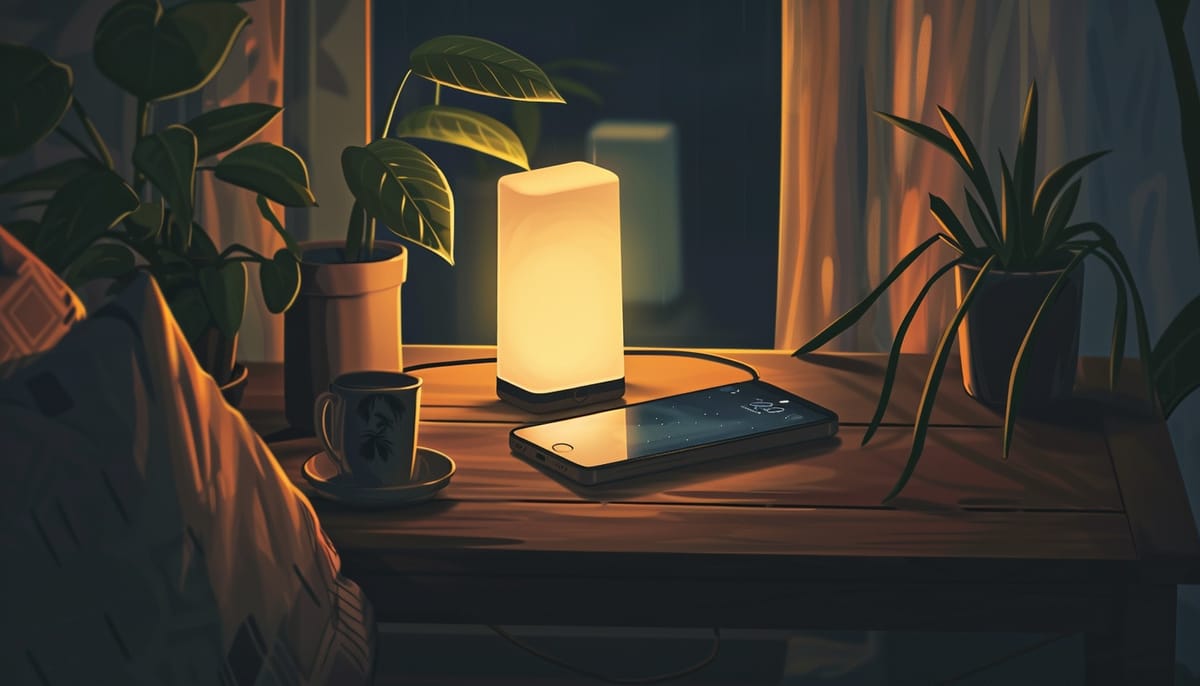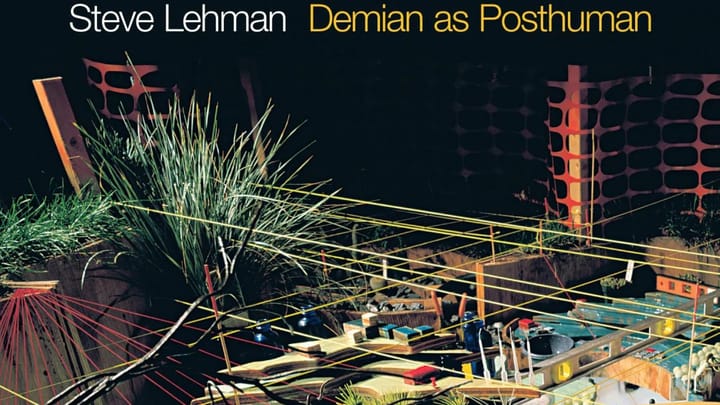With or Without Poise

A story on love by Daniel Francis Olivieri (@simplyTooLitBot), chosen by the Interintellect community as the winning entry of our February 2024 essay contest. Join us for future projects and contests in the community forum, with an upcoming writing workshop hosted by novelist Tara Isabella Burton.
My voice message mailbox is almost always almost full. Every few months it'll fill all the way up and I'll start getting exasperated texts that start, "I would have just left a message but..." Then I’ll go through and cull the messages from insurance salesmen and political campaigns until it’s only about 80% full and the cycle will start again. Why don’t I clear out my mailbox all the way? Because I’m willing to be a little rude if it preserves my access to manners.
Let me explain. When I was growing up, my Mom would often repeat the saying, "You don't fall in love with someone because of what they look like or for what they say or even what they do. You fall in love with their manner." The emphasis is her own—she would pronounce “manner” as if it belonged in italics. In her essay "Unnatural Gifts," Becca Rothfeld expands on my mother’s point. Previously in the essay, Rothfeld has described how as a college freshman she looked through the social media accounts of an upperclassman known for her beauty and found her rather ugly (“...she had the sickly countenance of an Eastern European peasant at the turn of the century”). Now Rothfeld has finally met the woman in person and realizes her error. "I had mistaken a disembodied photograph on Facebook for a person in motion. Perhaps the object of my fascination was gaunt and sallow out of context, but the fact is, people are trapped in context. They are always standing straight or slumped, always moving through a room with or without poise. This was not a case of someone unphotogenic who looked different in person. She looked exactly like her picture, but what she looked like had become beside the point." I think that’s what my mother was getting at: that a person’s manner can make almost everything else about them beside the point.
My aunt can pinpoint the moment that she started to fall in love with my uncle. She was sitting in his kitchen after their first or second date. He went over to the sink and started to recite Coleridge's “Kubla Khan” while he washed some dirty dishes. And that’s what did it: doing the dishes while reciting poetry. Who else would do something like that? In My So Called Life, Angela White (Claire Danes) loves how her crush Jordan Catalano (Jared Leto) “leans on things.” “He’s a great leaner,” her friend concurs. Love—not just attraction, but love—is all about trifles like these. Whether romantic or not, when we love someone, we end up loving their slightest ticks. We love that they say, “whatchamacallit” instead of “whatdoyoucallit” or how they mumble jargon about semiconductors in their sleep or how you can see the tip of their tongue just poking out of the corner of their lips when they make a wide turn while driving. In short, when we love someone, we love their mannerisms.
In Daily Rituals, Mason Currey writes that, “John Cheever thought that you couldn’t even type a business letter without revealing something of your inner self—isn’t that the truth?” If we agree that that’s true for something as sterile and formal as the business letters people write, then how much more true must it be for the voicemails people leave? They’re little extemporaneous speeches delivered to an audience of one, generally in the midst of the minor disappointment you feel when the person you’ve called hasn’t picked up. To say it another way, while we think we’ve been leaving informational messages we’ve actually been painting miniature audio self-portraits. They are all the more accurate for being offhand. These are not posed pictures, but candid shots.
Let’s take an example. At 12:19 on July 29th 2016, my sister Julia—22 at the time—was babysitting for our neighbor John who was then 8. I was away at a summer internship and the two of them gave me a call. Here’s the message they left when I didn’t pick up.
John: Hi Dan! It's John and...
Julia: Julia
(Mutual laughter)
John: ...um and Franklin and we... are... in... the... swing! Yay!
Julia: and we were just imagining we were flying to you and taking you back with us but you didn't come back with us and it was very frustrating. Goodbye.
John: Yeah!
I did what I could to write down what they said, but I couldn’t manage to transcribe their manner. For example, when John says, "Hi Dan! It's John..." he starts the "i" of "it's" so immediately after "Dan" that at first it sounds like he's calling me “Danny.” Another stenographer might have written it, "Hi Dann!yIt's John..." The exclamation point belongs right there in the middle of the word because that's where he put the emphasis. My transcription also doesn’t get across how John seems so happy to be in the swing that everything he says about it comes out as halfway to a shout of glee. Or how when John pronounces the name Franklin (my family’s dachshund), he breaks the name into two parts and puts the stress on the second one so it becomes “Frank-lin.” Or how he puts a “t” at the beginning of “swing” so it comes out “tswing.” When Julia takes over, she speaks much faster than John does and her "Goodbye" is so abrupt that it comes off as playfully rude: as if she somehow holds it against me that I didn't choose to come back with her and John in their imaginary game. So a closer transcription might read—
John: Hi Dann!yIt's John and...
Julia: Julia
(Mutual laughter)
John: ...um and Frank-lin and we... are... in... the... tswing! Yay!
Julia: (1.5x speed) and we were just imagining we were flying to you and taking you back with us but you didn't come back with us and it was very frustrating. (Abruptly) Goodbye.
John: Yeah!
Can you see why I refuse to delete messages like this? Yes, it’s a little rude to occasionally subject people who call me to, “The mailbox is full and cannot accept any messages at this time. Goodbye.” But deleting a message like this would mean forfeiting 42 seconds of Julia and John’s manner. That’s something I’m not willing to do, even if I might miss the chance to receive another sweet message in the future. I don't understand why our phones want to save every picture we take but assume voicemails should be thrown away like empty candy wrappers. If I had a particularly great picture of Julia and John on that swing I wouldn't delete it, so why am I expected to delete the voicemail they sent which is at least as precious? Saving a voicemail should be as simple as clicking a little heart next to it and seeing it whoosh away safely to a folder on your phone to be revisited any time you want.
The earliest voicemail I have is from November 19th, 2015. My friend Tristan called and left a message to let me know how hilarious my answering machine message was. Apparently, I’d recorded it before I hit puberty and I still sounded like a child. “At the end,” Tristan says, “you recite your name like it’s a book. So “by Daniel Olivieri” but you literally just said that on the answering machine, you don’t need to cite that (laughs).” Another voicemail (June 28th, 2016) is of my Dad who called to tell me he was about to see Finding Dory with my sister, but ended up talking about how he’d just seen a bough fall off a tree in the neighbor’s yard. Another one (September 5th, 2018) is from a college girlfriend, though the first voice I hear on it is my own. We’d been calling my phone hoping to hear the answering machine message that Tristan had laughed at three years before. It, unfortunately, was gone by then and I can hear her let out an extended, “Nooooo!” when she realizes that my embarrassing answering machine message is lost to history. Another one (October 1st, 2018) is from my Mom asking for the link to listen to my college radio show online. Another (November 18th, 2019) is Tristan again, this time trying to articulate his thoughts on idealism vs materialism. With this variety available, I feel a little like a memory connoisseur reviewing my collection, enjoying the flavors that you only get from this or that particular vintage.
Part of why I value voice messages so much is that I often find the parts of friendship that are conducted in solitude to be the most moving. It’s one thing for someone to spend time with you. It’s another for them to spend time for you when you’re not even around. My sister reading the First Bad Man after hearing me recommend it for the twentieth or thirtieth time or my friend Robert driving to pick me up from the airport when I flew into Seattle instead of leaving me to take an Uber. Gestures like this show that a person doesn’t just care about your company, but about you. Leaving a voicemail feels like a bite-sized example of this. While you’re off doing whatever it is that kept you from answering the phone, your friend is giving a little impromptu monologue for you to listen to at your leisure. They’re talking to you even though you aren’t even there. They trust you will be there eventually. This is why I feel a little guilty when I see how many of my voicemails have blue dots next to them. These feel like letters that I didn’t just not respond to, I didn’t even bother to open. In a very small way, it feels like I’ve failed to perform the primary function of a friend: to listen to the other person and respond. Keeping up your side of the conversation in a friendship seems so important to me because that’s what I think a friendship is: not two people who have a series of conversations, but one conversation held over the course of years.
The thing is, I can never quite manage to finish a conversation with someone I love. That might even make a good rule of thumb: I know I love someone if there’s always another thing I want to talk to them about. Last weekend, I spent three hours walking around the town I grew up in with my friend Spencer. We talked about everything from polyamory to the writer Miranda July to what classes we’d be if we were Dungeons and Dragons characters to a drunken argument we’d had with a stranger years before. Even after hours of talking to each other nonstop, on the drive home I kept on thinking of things we hadn’t gotten to. But it’s even more extreme than that. Last summer, I spent a month traveling with my cousin Julius. From when we woke up in the morning and groggily went to get breakfast to when we passed out exhausted in our hostel at night, we were together. And when we were together we were almost always talking. We discussed groupchat dynamics, the diegetic status of statues, whether it's worse to regret something you have done or something you haven't done, the semiotics of onigiri, whether you’re really yourself when you dream, and so on. Even a whole month didn't feel like quite enough time. It wasn’t just that our conversation didn’t feel finished when we parted ways, it still felt like it had hardly begun. On the plane ride back to the US, I kept thinking of more things I wanted to discuss. I could have asked him more about Russian grammar, for example. Or we could have talked about how phrases like, "May 35th" and "unalive" show language's fluidity in the face of censorship. Or I could have questioned him more about his time in Shanghai. To borrow a bit from Emerson, "I lamented the lost literature of his mind." This, too, is part of friendship. We don't just enjoy our friend's company; we also dislike their absence. And so it's no surprise that technology has given us so many ways to be with people even when we're apart from them, to give us access to their manners when we can't have them themselves.
While a friendship might be a single long conversation, it’s never the same two people who have it. Each year, each month, each week leaves you both different people. It’s this continual process of a different me speaking to a different you that I find makes long term friendships so rewarding. And this is another virtue of voice messages: they are accidental time capsules. It’s not just my friend Ben Hewitt who leaves the voicemail or my Dad or Tristan Fogt. It’s the Ben Hewitt of August 2018, the Dad of June 2016, the Tristan Fogt of November 2015. Those versions of them are now long gone. Listening to the messages they left gives me the rare chance to go back to an earlier era, to step in the same river twice.
Late July 2016 must have been a real heyday of voice messages for my sister, because she left another message just the day before the one with John I quoted earlier. Here it is.
Julia: Hey Dan, it was kind of you not to pick up just then so I could again experience the feeling that I had known very well before of knowing someone’s not going to pick up... Also, umm, oh, yeah I just wanted to tell you that I do listen to all my messages but I especially always listen to yours because they’re always amazing. And not only do I listen to them, but I save them... Just so you know. But I guess you might not listen to this one. Anyway, bye!
This is just the kind of trick Julia would play: telling me that she listens to my voicemails in a voicemail so that I'll only ever know she listens to mine if I listen to hers. And I did listen to hers, even if it took me a few years to get around to it. It was worth the wait.



